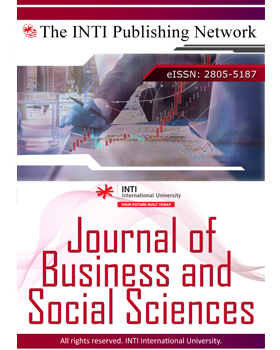
Journal Information
eISSN: 2805-5187
Peer Review
The review process of papers submitted to JoBSS are assessed in two sequential steps: (1) the desk review and (2) double blind review.
Desk Review
The desk review is to preliminarily determine if the article falls within the scope and intent of the journal and whether it satisfies the required quality. If the paper is either rejected or accepted at desk review, the author will be notified of the reasons for rejection and the paper shall be escalated to a double-blind peer review. However, a paper accepted at the desk review does not automatically guarantee the acceptance of reviewers at the later stage. At the desk review, the Managing Editor (ME) and or Associate Editors (AE) will evaluate the work based on the following questions depicted below:
1. Does the work fall within the requirement of contemporariness?
2. Does the work portray significant positive social impact and the SDG principles?
3. Does the work uplift humanity, managerial and social concerns?
Note: For a better understanding on the role of editors please click here: https://beta.elsevier.com/about/policies-and-standards/publishing-ethics#2-duties-of-editors.
Double Blind Review
Once the paper is accepted at desk review, the paper will then be double blind reviewed. The double-blind review is conducted once every quarterly. In a double-blind review, the article will be forwarded to at least two academic experts in their field and reviewers are normally deemed to have a doctoral qualification. The double-blind is conducted every quarterly and reviewers are given 14 days to review the paper with an additional 7 days maximum with appropriate reasons. In the event a reviewer does not return a verdict in time, the ME will then have the discretion to make the final decision. In a double-blind review, the article will be examined from the following perspectives:
1. Does the work have a good abstract?
2. Does the work address a notable and publish worthy research gap?
3. Is the work well referenced with high quality references?
4. Is the work well structured and organized?
5. Is the work free from linguistic errors?
6. Are the findings well postulated (if any)?
7. Is the work grounded with a strong and clear conclusion?
8. Is there an implication for future research?
The results of the review could be either (1) accepted without revision or (2) accepted with minor revisions or (3) accepted with major revisions or (4) rejected. However, if there is a hung decision by the reviewers, the ME or the AE will make the final decision. Reviewers’ identities are anonymous unless the reviewer indicates otherwise.
Note: For a better understanding on the role of the reviewers please click here https://beta.elsevier.com/about/policies-and-standards/publishing-ethics#3-duties-of-reviewers.
The authors will then be notified of the decision and where applicable to revise the work as required. The entire process will take between two to three months or more depending on the speed of response from the authors.
The summary of the review process is as follows:
Step 1 |
Desk Review by Managing Editor / Associate Editors. Author informed in writing of the decision. The desk review decision may be (1) accepted (2) conditional acceptance (3) rejected. In a conditional acceptance, the author must make changes according to the preliminary suggestions by the editor. |
20 to 30 days |
Step 2 |
Author returns the revised manuscript in accordance with the requirements stated in the desk review |
20 – 30 days |
Step 3 |
Paper sent for double blind review |
Quarterly review January, April, July, September, and December – Reviewers are given 30 days to 60 days maximum to review the papers |
Step 4 |
Decision conferred to author either (1) accepted without revision, (2) accepted with minor revision, (3) accepted with major revision or (4) rejected |
Authors will, depending on the decision, amend their works using the Amendment Tracking Form (ATF) to highlight the amendments made in accordance with the comments made by the reviewers. In cases where the previous paper is rejected, authors may submit a fresh paper with a substantially different content and title. |
Step 5 |
Acceptance letter |
Upon satisfactory amendments, the author will receive an acceptance letter from the journal stating the date the paper received, the date the final version of the paper accepted, the title, the names, and affiliations of the paper. |
Step 6 |
Paper processing |
The paper will be processed and published digitally on e-print |
Note: Authors must always ensure to abide by their duties and be well reminded of the ethics of publication. Authors must revise their work accordingly and ensure that the work is error free. Authors must detail the revisions made in the revision template provided and all queries raised by reviewers must be addressed. Upon receiving the final edition of the work, the ME and AE will prepare the paper for final editing and to be included in the journal listing and repository.
Authors must always abide by the ethical policies of the journal, keeping the highest standards of integrity, honesty, and transparency.
Note: For a better understanding on the ethical policies and role of an author please click here https://beta.elsevier.com/about/policies-and-standards/publishing-ethics#4-duties-of-authors.
ROLES AND RESPONSIBILITIES
JOBSS editors guide the journal’s vision, oversee rigorous reviews, make informed decisions, and uphold ethical standards. Reviewers provide expert, unbiased evaluations, ensuring alignment with journal standards and maintaining confidentiality. Authors submit original, accurate work following guidelines and engaging with the review process. The publisher provides infrastructure, manages copyright, supports ethics, and ensures preservation. Please CLICK HERE for more information.


